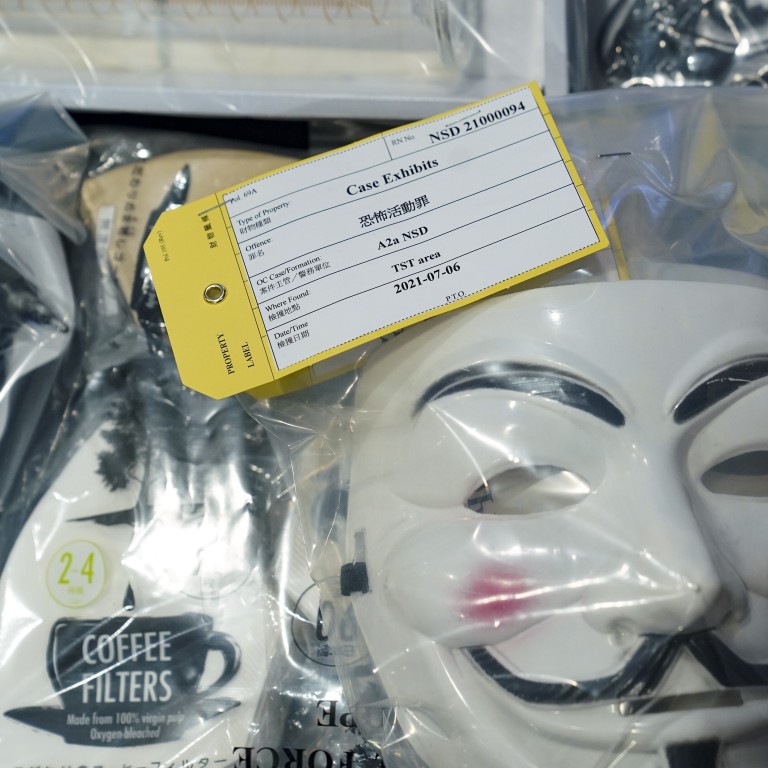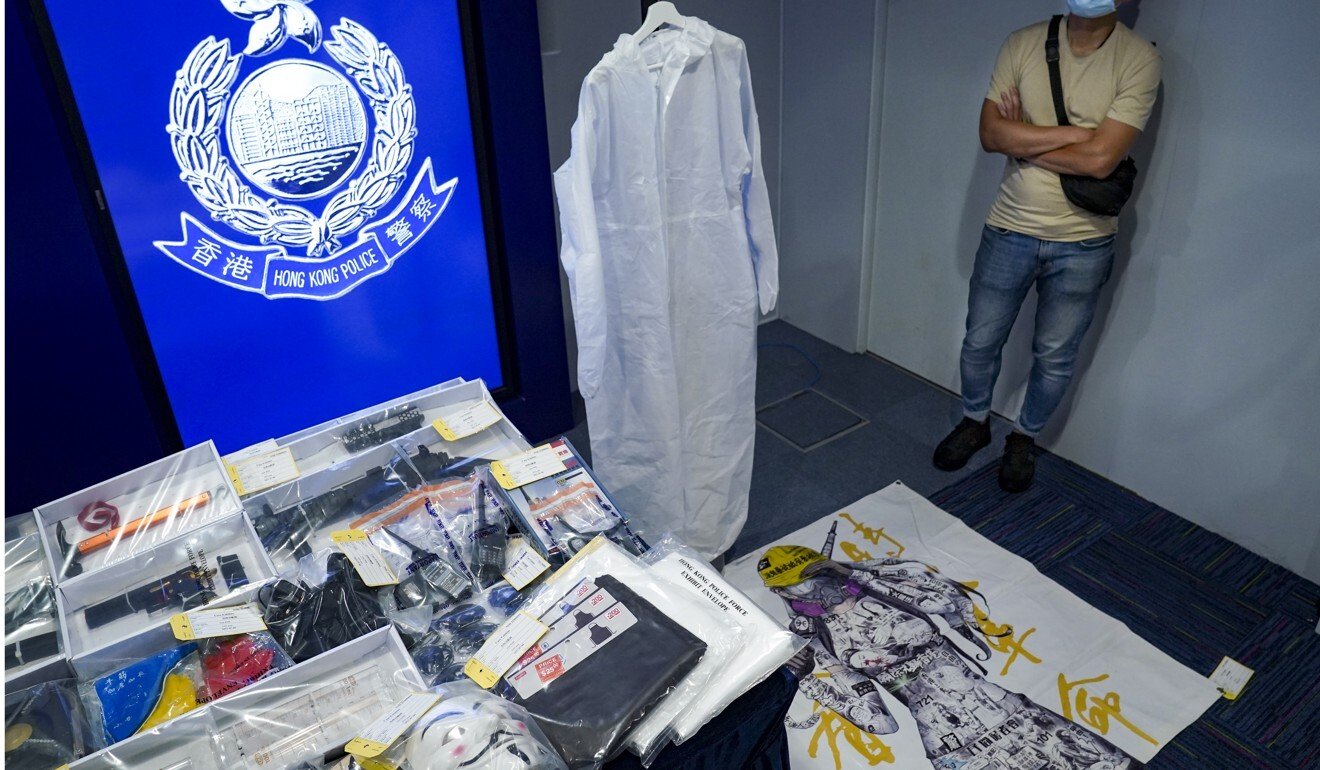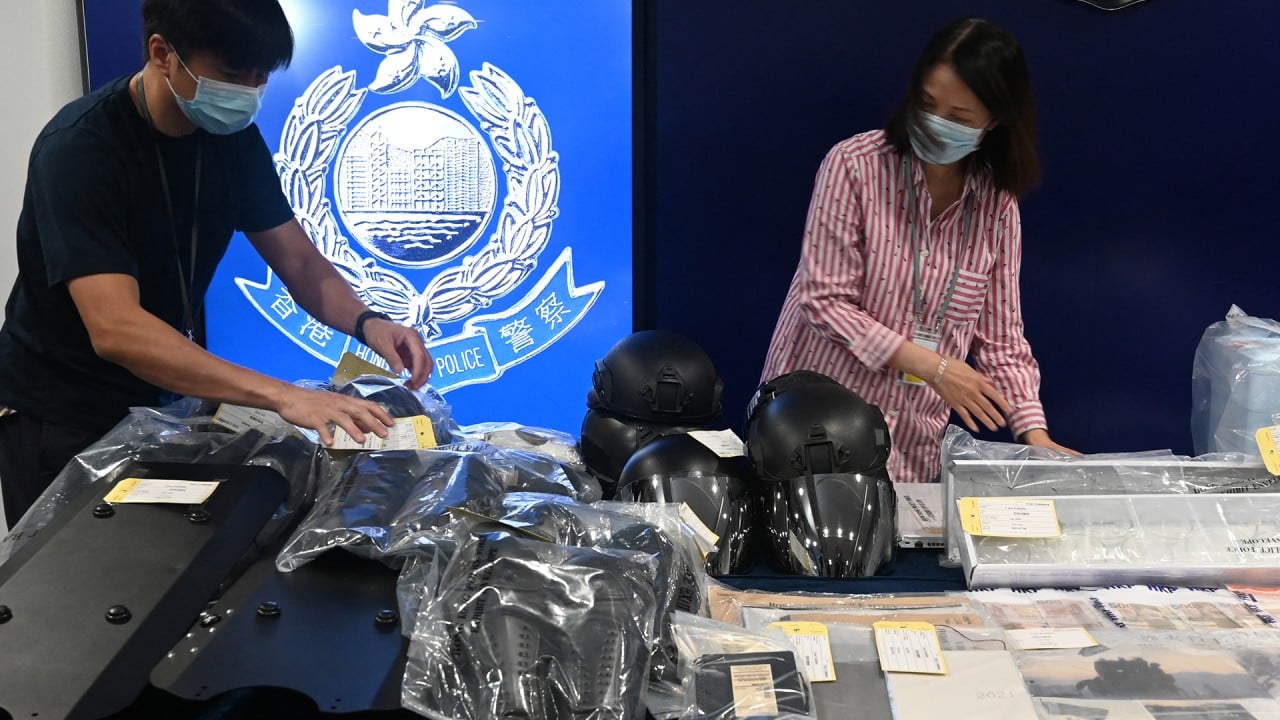
National security law: students and university employee among 9 arrested over alleged terrorist plot to bomb streets, courts, transport networks
- Police discover makeshift bomb laboratory in a guest house in Tsim Sha Tsui during raid
- Pro-independence group Returning Valiant recruited teens to carry out the attacks and was planning to help them flee, force says
Hong Kong’s national security police have arrested nine people, most of them teenagers, over an alleged terrorist plot by a pro-independence group to bomb courts, tunnels and streets in a series of attacks in the coming week.
Alarming details of the case were revealed on Tuesday by the force’s National Security Department while the city’s leader warned of hidden threats in the community and vowed to tackle them with more legislation and law enforcement.
Police said they had carried out a series of raids the day before and broken up a well-organised group in the final stages of preparing the attacks.
“Our investigation revealed that the gang planned to launch a series of bomb attacks before mid-July,” a source said.

The suspects included six students – four boys and two girls aged between 15 and 18 – and a staff member at Baptist University. Police were also hunting for others suspected of funding the plot.
Senior Superintendent Steve Li Kwai-wah said officers raided a guest house on Nathan Road in the Tsim Sha Tsui shopping district at around noon on Monday and discovered a makeshift laboratory set up in a small room which had been rented since June.
Two teenagers were arrested at the scene, where police seized a trace quantity of explosives, two bottles of liquid chemicals and laboratory equipment required to produce triacetone triperoxide, a highly unstable and powerful explosive known as TATP.
“They wanted to produce TATP and use it to attack public facilities in Hong Kong, including the cross-harbour tunnels, railways and court rooms,” Li said. “They even wanted to lay a bomb in a rubbish bin on a street with a view towards maximising the damage caused to society.”
National security police ‘have list of people to be arrested if they try to flee’
According to police, the six secondary school goers were recruited by a group known as “Returning Valiant”, which promoted Hong Kong independence on its website and through fliers.
The organisation was planning to help the suspects flee the city after the attacks and had funds ready to finance their escape, investigators found.
Returning Valiant confirmed on its website that some members had been arrested and vowed the remaining ones would “continue to gather talents and fight against tyranny”.
The operation was highly organised, according to Li, with members assigned specific roles to carry out the plot, such as handling funds or buying the bomb-making chemicals.
“Some of those we call ‘scientists’ wanted to produce TATP inside the room,” he said.
Others were responsible for scouting potential targets, which included at least two courts, according to Li. A source identified them as Eastern Court and Tuen Mun Court, adding that authorities were investigating why the two in particular were targeted.

02:15
Hong Kong police arrest nine over alleged terrorist plot to bomb streets, courts, transport networks
The arrested staff member at Baptist University was believed to have provided funding, and police had frozen HK$600,000 (US$77,240) in his bank accounts, according to a source. He was identified by an insider as a public relations officer working at the university’s School of Continuing Education.
His wife was among the arrested and she worked as an administrative staff member at a secondary school, the source said, adding the couple had previously driven protesters home from demonstrations.
The six teenagers came from three different schools. Officers found more than HK$80,000 in their possession, and seized another HK$10,000 in foreign currency that they were meant to receive after fleeing.
Communication devices and overseas SIM cards were also seized, along with manuals outlining details of how to plant bombs and laying out plans for escape.

The latest police operation marked the second seizure of explosives in Hong Kong within a week.
Officers arrested two men and seized explosive substances during a raid on their homes last Tuesday after they allegedly made posts online promising to kill “well-known figures” and cause “bloodshed” at police stations.
Both the national and Hong Kong governments have stressed the need for greater security in major speeches over the past week.
Hong Kong anti-doxxing law fears will be proven false, Lam assures tech giants
Just hours before news of the latest arrests was made public on Tuesday, the chief executive underscored the need to implement follow-up legislation and do more to combat what she characterised as lingering risks to national security posed by “foreign forces” and social media.
“These show that ‘black violence’ has transformed from actions conducted by a crowd on the ground, to hidden, individualised acts,” she warned, referring to the knife and arson attacks.
Secretary for Security Chris Tang Ping-keung warned that people expressing sympathy and support for the perpetrators of such crimes would only encourage more violence, referring in particular to those who laid flowers at the scene of the knife attack to “mourn” the assailant.
“These attacks have already spread to every corner of the city,” Tang said. “Everyone could be a victim.”
Additional reporting by Tony Cheung



